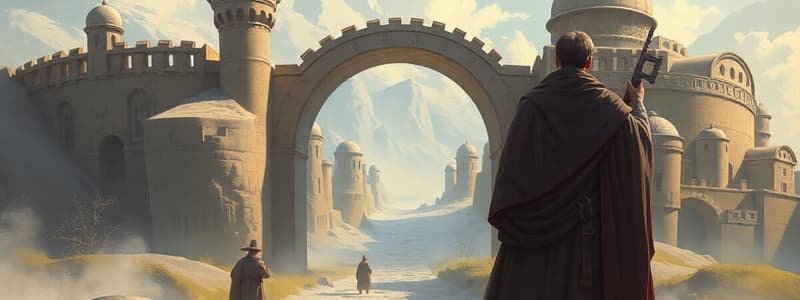Podcast
Questions and Answers
What is the significance of chronology in historical study?
What is the significance of chronology in historical study?
- It offers a subjective interpretation of historical events.
- It helps with the preservation of historical artifacts.
- It provides a framework for writing history textbooks.
- It arranges events in the order they occurred, aiding cause and effect understanding. (correct)
Which of the following is an example of a primary source?
Which of the following is an example of a primary source?
- A letter written by a soldier during World War I. (correct)
- A documentary film analyzing World War II.
- A textbook discussing the Industrial Revolution.
- An encyclopedia entry on the Middle Ages.
What characterized the Middle Ages in Europe?
What characterized the Middle Ages in Europe?
- The rise of democracy and individual rights.
- The establishment of city-states and economic trade systems.
- Feudalism, the spread of Christianity and Islam, and monarchies. (correct)
- A focus on scientific discovery and technological advancement.
How did the Renaissance influence European society?
How did the Renaissance influence European society?
What is a critical aspect of historical interpretation?
What is a critical aspect of historical interpretation?
What are the main stages of historical methodology?
What are the main stages of historical methodology?
Which events are commonly associated with modern history?
Which events are commonly associated with modern history?
Who is often referred to as the 'Father of History'?
Who is often referred to as the 'Father of History'?
Flashcards are hidden until you start studying
Study Notes
Overview of History
- Definition: The study of past events, particularly in human affairs.
- Purpose: To understand how past actions shape the present and future.
Key Concepts
-
Chronology:
- The arrangement of events in the order they occurred.
- Important for understanding cause and effect.
-
Historical Sources:
- Primary Sources: Original documents or evidence from the time, e.g., letters, photographs, artifacts.
- Secondary Sources: Interpretations or analyses of primary sources, e.g., textbooks, articles.
-
Historical Interpretation:
- Different perspectives and narratives can shape the understanding of history.
- Historians may have biases influenced by personal, cultural, or societal contexts.
Major Periods in History
-
Prehistoric Era:
- Time before written records.
- Includes events such as the Stone Age.
-
Ancient History:
- Development of writing systems (c. 3500 BCE).
- Civilizations such as Mesopotamia, Ancient Egypt, Indus Valley, and Ancient China.
-
Classical Antiquity:
- Rise of empires (e.g., Roman, Persian, Greek).
- Philosophical advancements and cultural developments (e.g., Socratic method, democracy).
-
Middle Ages:
- Characterized by feudalism, the spread of Christianity and Islam, and the rise of monarchies.
- Important events: The Crusades, the Black Death.
-
Renaissance and Reformation:
- Cultural rebirth in Europe (14th-17th centuries).
- Emergence of humanism and challenges to the Catholic Church.
-
Modern History:
- Industrial Revolution (18th-19th centuries): Significant technological and social changes.
- Major events: World Wars, Cold War, decolonization.
Historical Methodology
- Research: Gathering information from various sources.
- Analysis: Synthesizing data to identify trends, causes, and effects.
- Presentation: Communicating findings through essays, lectures, or publications.
Importance of History
- Cultural Identity: Helps societies understand their roots and traditions.
- Lessons Learned: Provides insight into human behavior and decision-making.
- Informed Citizenship: Understanding history is essential for participating in democratic processes.
Notable Historians
- Herodotus: Often referred to as the "Father of History."
- Thucydides: Known for his critical historiography of the Peloponnesian War.
- Karl Marx: Developed a historical interpretation based on class struggle.
Themes in History
- War and Conflict: Examining causes, strategies, and consequences.
- Economics: The impact of trade, resources, and industry on societies.
- Social Structures: Class, gender, and race dynamics throughout history.
Conclusion
Understanding history is crucial for recognizing patterns in human behavior, appreciating cultural diversity, and fostering informed global citizenship.
Overview of History
- History encompasses the study of past events, particularly human affairs.
- Its primary purpose is to elucidate how past actions influence current and future happenings.
Key Concepts
- Chronology:
- Refers to arranging historical events in chronological order, vital for analyzing cause and effect relationships.
- Historical Sources:
- Primary Sources: These include original materials such as letters, photographs, and artifacts from a specific time.
- Secondary Sources: Comprise interpretations or analyses of primary sources, such as textbooks and scholarly articles.
- Historical Interpretation:
- Different historical narratives arise from varying perspectives and may reflect historians' biases shaped by personal, cultural, or societal influences.
Major Periods in History
- Prehistoric Era:
- Encompasses the time before written records, including the Stone Age.
- Ancient History:
- Marked by the advent of writing systems around 3500 BCE, featuring civilizations like Mesopotamia, Ancient Egypt, Indus Valley, and Ancient China.
- Classical Antiquity:
- Notable for the rise of significant empires such as the Roman, Persian, and Greek, alongside philosophical advancements like the Socratic method and concepts of democracy.
- Middle Ages:
- Characterized by feudalism, the rise of Christianity and Islam, and the establishment of monarchies; key events include the Crusades and the Black Death.
- Renaissance and Reformation:
- A cultural revival in Europe from the 14th to the 17th centuries, marked by the rise of humanism and challenges to Catholic Church authority.
- Modern History:
- Features the Industrial Revolution (18th-19th centuries), which brought substantial technological and social changes; significant occurrences include the World Wars, the Cold War, and decolonization.
Historical Methodology
- Research: Involves the gathering of information from diverse sources to underpin studies.
- Analysis: Entails synthesizing gathered data to discern patterns, causes, and implications.
- Presentation: Communicates findings via essays, lectures, or publications, contributing to academic discourse.
Importance of History
- Cultural Identity: Facilitates societal understanding of their roots and traditions.
- Lessons Learned: Offers perspectives on human behavior and decision-making processes throughout time.
- Informed Citizenship: Grasping historical contexts is crucial for active engagement in democratic practices.
Notable Historians
- Herodotus: Acknowledged as the "Father of History" for his contributions to historical writing.
- Thucydides: Known for his critical approach to historiography, particularly concerning the Peloponnesian War.
- Karl Marx: Proposed a historical interpretation centered on the dynamics of class struggle.
Themes in History
- War and Conflict: Investigates causes, strategies, and repercussions of wars throughout history.
- Economics: Analyzes the influence of trade, resources, and industries on societal development.
- Social Structures: Explores the dynamics of class, gender, and race through historical contexts.
Conclusion
- Grasping history is essential for identifying recurring human behavioral patterns, appreciating cultural variety, and fostering informed global citizenship.
Studying That Suits You
Use AI to generate personalized quizzes and flashcards to suit your learning preferences.




